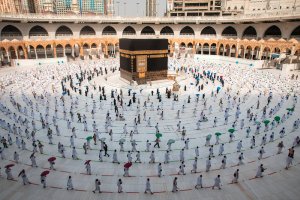As the United States crossed a grim milestone at 100,000 coronavirus deaths on May 27, the Episcopalian Church joined more than 100 religious institutions in calling for a National Day of Mourning and Lament on June 1.

“I encourage Episcopalians to join with other people of faith this weekend to grieve and honor those who have died from COVID-19,” the Church’s Presiding Bishop, Michael Curry, said in a news statement. “Let this tragic moment not pass without us honoring the many among us who have lost their lives or lost their loved ones and commending them and ourselves to God’s love and peace.”
The call issued by the Episcopalian Church, which has “often been seen as the religious institution most closely associated with the American establishment,” according to Pew Research Center, was supported by the U.S. Conference of Mayors, which represents more than 1,400 mayors leading the nationwide pandemic response effort.
As they have often done during times of national crises, mayors “model critical local leadership” during the coronavirus calamity, the Episcopalian Church stated in its May 27 news briefing. “Together, interfaith leaders and mayors across the nation will call us to mourn, lament, and honor the dead, acknowledge the unequal nature of our suffering, pray together for the healing of the nation, and recommit to the difficult work ahead.”
Bishop Curry called for “a weekend of services—Friday Muslim, Saturday Jewish, and Sunday Christian (including Protestant, Catholic, Evangelical, African American, Hispanic, Asian American, and Native American), all united in times of lament and mourning for the dead,” the statement concluded. “The vocation of remembering will unite across lines of religion and traditions and transcend our politics.”
Also on May 27, Catholic News Service reported that the Leadership Conference of Women Religious (LCWR), an association of about 1,300 leaders of congregations of more than 40,000 Catholic sisters in the U.S., announced it will join the call for a National Day of Mourning and Lament by faith leaders. LCWR, based in the Washington, D.C., suburb of Silver Spring, “is urging federal, state and local elected officials to observe the day as well, which will be marked by moments of silence, lowering of flags, interfaith vigils, ringing of bells and civic memorials,” the news report stated.
“Elders, black and brown neighbors, native communities, refugees and immigrants have borne disproportionately the brunt of sickness and death…the healing of the nation must face the brokenness of its democracy as they call for the repair of the injustices this pandemic has revealed.”
“The lament will also acknowledge the hard truth this country has learned during this pandemic—that suffering has been unequal,” the report quoted LCWR as saying. “Elders, black and brown neighbors, native communities, refugees and immigrants have borne disproportionately the brunt of sickness and death. The faith leaders underscore that the healing of the nation must face the brokenness of its democracy as they call for the repair of the injustices this pandemic has revealed.”
Meanwhile, on May 29, Deb Haaland, a Democratic Congresswoman from New Mexico, announced she was joining a bipartisan resolution in the U.S. House of Representatives, calling for a national day of mourning for the lives lost in the pandemic. The resolution also proposes recurring moments of silence on the House floor as well as the creation of a national monument to honor the deceased and the families impacted by their departure.
The announcement noted that the House resolution was inspired by a May 15 opinion piece in The Washington Post by University of Connecticut history professor Micki McElya, which spoke of “a conspicuous absence of any collective mourning,” prompting the motion’s authors to put the Op-Ed’s words into “tangible actions to fully and continuously honor the lives lost.”
China, where the coronavirus pandemic began, observed a national day of mourning on April 4, four days after Italy mourned its victims. Spain began an official 10-day mourning period on May 27.
“Shared grief brings people together like little else,” McElya wrote in her article. “In the absence of the common bonds of kinship, place, language, faith or heritage, national identity is forged in ritual and the sense of shared experience among strangers, the vast majority of whom will never know one another.”
_______________
From its beginnings, the Church of Scientology has recognized that freedom of religion is a fundamental human right. In a world where conflicts are often traceable to intolerance of others’ religious beliefs and practices, the Church has, for more than 50 years, made the preservation of religious liberty an overriding concern.
The Church publishes this blog to help create a better understanding of the freedom of religion and belief and provide news on religious freedom and issues affecting this freedom around the world.
For more information visit the Scientology website or Scientology Network.


